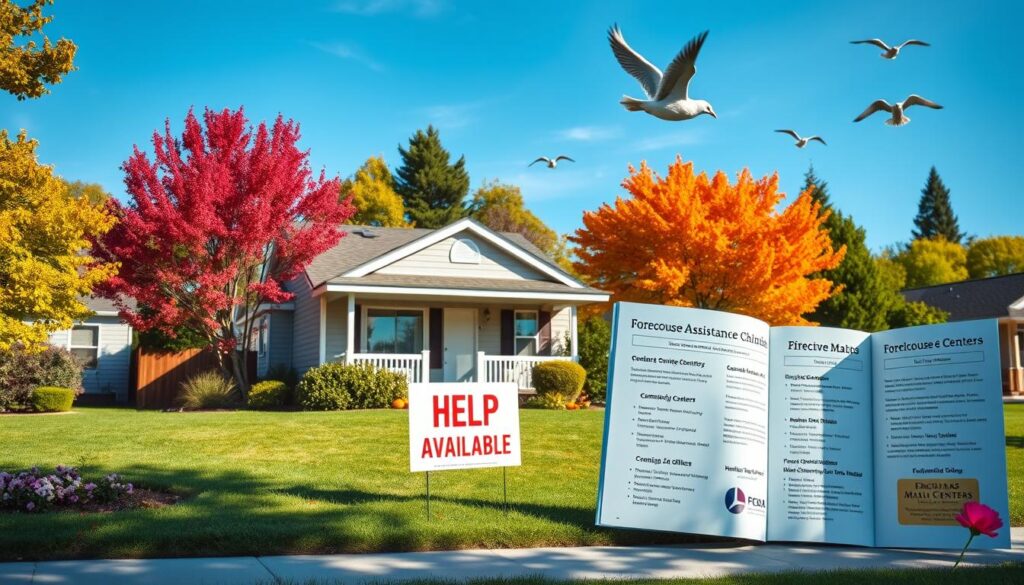Are you among the millions worried about foreclosure? With over 2.5 million homeowners facing foreclosure, knowing your options is key. These grants aim to help those struggling with mortgage payments due to hard times, like COVID-19.
The Homeowner Assistance Fund (HAF) has helped over 549,000 families. It’s important to see how these grants can offer critical support when needed.
Key Takeaways
- Foreclosure assistance grants offer crucial financial support for struggling homeowners.
- The Homeowner Assistance Fund has allocated $9.961 billion to aid families facing financial distress.
- Majority of HAF beneficiaries include low-income and traditionally underserved homeowners.
- Foreclosure filings have remained below pre-pandemic levels, indicating effective support measures.
- Resources like HOPE NOW and the HOPP hotline provide free assistance and counseling.
Understanding Foreclosure and Its Impact on Homeowners
Foreclosure is a big financial problem for many homeowners. It happens when lenders take back a property because the borrower can’t pay. This affects not just the homeowner but also the community and housing market. Knowing how foreclosure works is key to getting help.
What is Foreclosure?
Foreclosure is when lenders take back a property because of unpaid loans. It can happen for many reasons, like losing a job or unexpected bills. As more people face foreclosure, finding help is more urgent.
How Foreclosure Affects Homeowners
Foreclosure has a big impact on homeowners. They risk losing their homes and face long-term problems, like:
- Loss of Home Equity: They might lose their investment in the property. This leaves them without assets for the future.
- Credit Score Damage: Foreclosure can lower credit scores a lot. This makes it hard to get loans later.
- Emotional Stress: The stress of facing foreclosure can cause anxiety and depression.
The COVID-19 pandemic has made many homeowners more vulnerable to foreclosure. Programs like the Homeowner Assistance Fund (HAF) help, but delays in funding can make things worse. Getting reliable housing assistance is crucial for those facing foreclosure.
Types of Foreclosure Assistance Grants Available
Many programs help homeowners fight foreclosure. Knowing these options can offer crucial relief and guidance. Here are some key programs that provide financial aid for foreclosure.
Emergency Mortgage Assistance Program (EMAP)
The Emergency Mortgage Assistance Program (EMAP) helps those hit hard by the COVID-19 pandemic. It offers foreclosure prevention grants for mortgage payments, utility bills, and more. You can get up to $40,000, based on your need, making it a big help for many families.
Homeowner Assistance Fund (HAF)
The Homeowner Assistance Fund (HAF) supports homeowners at risk of foreclosure. It helps with housing costs, keeping families in their homes. Check your state’s requirements, as programs vary. State-specific help can be found through local housing agencies or state finance offices.
State-Specific Grants and Programs
States have special programs for their residents. These include grants for financial relief and counseling. To find these, visit your state’s housing agency websites or check detailed resources. Knowing local options is key to getting the most help and protecting your home.

Eligibility Criteria for Foreclosure Assistance Grants
Knowing what you need to qualify for foreclosure help is key. These programs aim to help those who really need it. If you’re facing financial trouble, especially because of COVID-19, you might be eligible for aid.
General Requirements for Assistance
To get foreclosure grants, you must show you’re struggling financially. You’ll need to apply and share your story. This could be about losing your job, making less money, or unexpected medical bills.
Many programs want proof of your financial struggles. This ensures help goes to those who really need it.
Income Limits and Property Types
How much money you make also matters. Each program has its own income limits. These are set to help those who earn less.
What kind of property you own is also important. You must live in your home and it must meet certain criteria. For example, some programs only help with certain types of homes.

| Criteria | Description |
|---|---|
| Financial Hardship | Proof of income reduction, job loss, or medical expenses. |
| Income Limits | Varies by program, targeting lower-income homeowners. |
| Property Eligibility | Homeowners must occupy their primary residence, specific property types may apply. |
| Grant Amount | Up to $80,000 to cover past due payments and associated costs. |
| Application Process | Online submissions required; reviews may take time. |
Application Process for Foreclosure Assistance Grants
Getting help with foreclosure involves several important steps. Homeowners need to share detailed information to show their needs. This helps increase the chance of getting the aid they need.
Steps to Apply for EMAP and HAF
To apply for programs like EMAP and HAF, homeowners should follow these steps:
- Check if you meet the basic requirements for each program.
- Collect all needed documents about your finances and property, making sure they’re correct.
- Apply online, telling your story and why you need help.
- Keep an eye on your application and answer any questions quickly.
Required Documentation for Application
Knowing what documents you need is key to a strong application. You might need:
- Proof of income, like pay stubs or tax returns.
- Proof of mortgage problems or foreclosure if it’s happening.
- Details about your property, including title and mortgage statements.
- Any other documents that show your financial struggles.
It’s smart to check official resources, like this guide, for more info. Also, watch the deadlines and funds for HAF, as they can run out fast or have specific end dates, like September 2026.
Additional Resources for Homeowners Facing Foreclosure
Homeowners facing foreclosure have many resources to help. Nonprofit groups offer foreclosure assistance programs and services. These help families stay in their homes by providing guidance and support.
Nonprofit Organizations Offering Assistance
Nonprofits help prevent foreclosure by addressing homeowners’ needs. NeighborWorks has a toll-free hotline, HOPE for Homeowners, for advice. The National Community Reinvestment Coalition (NCRC) helps with refinancing due to predatory lending.
Fannie Mae’s HomeStay Initiative offers flexible mortgage products. It also provides counseling and foreclosure prevention services.
Housing Counseling Services
HUD-certified housing counselors offer professional help. They are funded by the U.S. Department of Housing and Urban Development (HUD). Homeowners can call 1-800-569-4287 to find a counselor.
Programs like Freddie Mac’s foreclosure-avoidance initiative and The ROOF Project in Greater New Haven offer free help. They connect homeowners with accredited counselors and resources. These housing counseling options give homeowners the tools to fight foreclosure.
How to Avoid Foreclosure: Tips for Homeowners
Foreclosure can be scary for homeowners. Taking action early can help a lot. Knowing about mortgage relief options is key to finding the right help.
Understanding Mortgage Relief Options
The Making Home Affordable Program offers many ways to avoid foreclosure. It helps keep the housing market stable and lowers monthly payments. If you’re unemployed or owe more than your home, there are mortgage modifications, forbearance, and refinancing options.
Importance of Early Action and Communication With Lenders
Acting fast is important when facing financial trouble. Talking to your lender early can prevent a lot of damage. If you’re having trouble paying, contact your lender to explore options.
The FHA also has programs to help homeowners. The FHA National Servicing Center can guide you. For more help, HUD-approved housing counseling agencies offer free or low-cost advice.
| Mortgage Relief Options | Description |
|---|---|
| Mortgage Modification | Adjusts loan terms to reduce monthly payments permanently. |
| Forbearance Agreement | Allows deferment of mortgage payments for a limited time. |
| Refinancing | Involves obtaining a new loan with better terms to lower payments. |
| Homeowner Assistance Fund (HAF) | Offers funds to states to help homeowners with housing-related costs. |
Ignoring the problem can lead to big problems. Stay away from companies that charge a lot for help. By using the right resources, you can get through this tough time.
Conclusion
Foreclosure assistance grants are key for homeowners in tough times. With more loans going bad and homes being lost, help is needed fast. Knowing about programs like the Emergency Mortgage Assistance Program can help homeowners stay in their homes.
It’s also vital to understand foreclosure prevention strategies. Homeowners must talk to lenders and look into refinancing. Programs like FHASecure help by offering better loan terms, keeping homes and equity safe.
These resources and timely actions help homeowners face the housing market’s challenges. With the right planning and support, they can avoid foreclosure and keep their homes.






